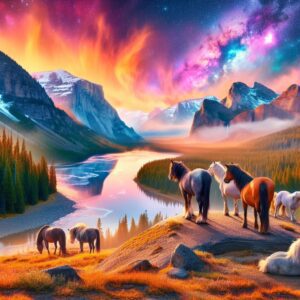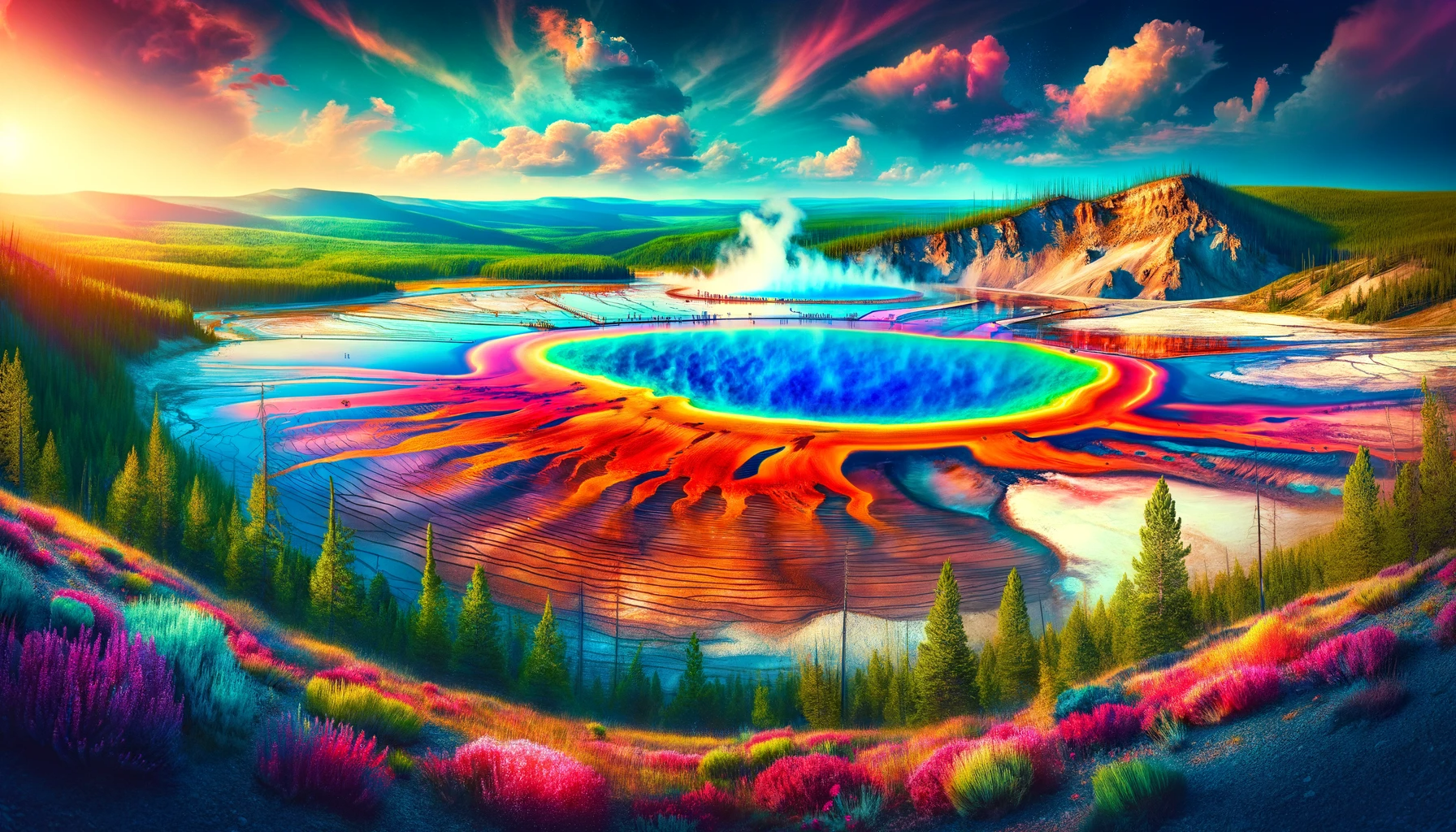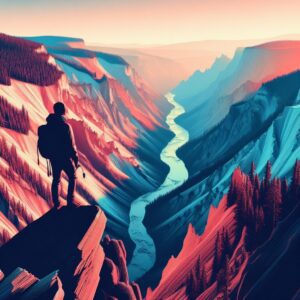Yellowstone national park guide: 25 Awesome attractions
Introduction
Welcome to the majestic world of Yellowstone National Park, a true American treasure! Nestled in the heart of nature’s grandeur, Yellowstone isn’t just a park; it’s an adventure waiting to unfold. Imagine waking up to the song of wild birds, the aroma of pine trees, and the anticipation of spotting a majestic bison or a playful bear in their natural habitat. This isn’t a scene from a nature documentary; it’s what every day feels like in Yellowstone.
In this blog, we’re diving deep into the heart of Yellowstone, exploring its geysers that shoot water to the sky like natural fireworks, the serene lakes reflecting the endless skies, and the trails that take you through landscapes so beautiful, they’ll make your heart skip a beat. Whether you’re a seasoned traveler or planning your first visit, our insider tips and stories will help you experience Yellowstone like never before. So, lace up your hiking boots, grab your camera, and let’s embark on a journey through the wonders of Yellowstone National Park! 🌲🐾🏞️
Yellowstone National Park attractions:
Here’s a table listing the top 25 attractions in Yellowstone National Park and what makes each place special:
| No. | Attraction | Special Features |
|---|---|---|
| 1 | Old Faithful | Iconic geyser known for its predictable eruptions, a symbol of Yellowstone. |
| 2 | Grand Prismatic Spring | The park’s largest hot spring, known for its striking colors and enormous size. |
| 3 | Yellowstone Lake | The largest high elevation lake in North America, offering stunning views and boating opportunities. |
| 4 | Hayden Valley | A wildlife paradise, great for viewing bison, elk, and sometimes bears. |
| 5 | Mammoth Hot Springs | Unique terraced hot springs with remarkable limestone formations. |
| 6 | Lamar Valley | Known as America’s Serengeti for excellent wildlife watching, especially wolves. |
| 7 | Norris Geyser Basin | The park’s hottest and most dynamic geyser basin. |
| 8 | Lower Yellowstone River Falls | Spectacular waterfall in the Grand Canyon of the Yellowstone, famous for its scenic beauty. |
| 9 | Grand Canyon of the Yellowstone | Deep canyon with stunning multicolored rock walls, offering breathtaking views. |
| 10 | Upper Geyser Basin | Home to the highest concentration of geysers in the world. |
| 11 | West Thumb Geyser Basin | Features hot springs and geysers along the shore of Yellowstone Lake. |
| 12 | Tower Fall | Dramatic 132-foot waterfall, easily accessible and visually striking. |
| 13 | Artist Point | Offers one of the most photographed views of the Lower Falls and canyon. |
| 14 | Mount Washburn | Popular hiking destination with panoramic views of the park. |
| 15 | Fountain Paint Pot | Mud pots displaying a variety of colors and geological activity. |
| 16 | Midway Geyser Basin | Home to the Grand Prismatic Spring and other large hot springs. |
| 17 | Roosevelt Arch | Historic stone arch at the north entrance of the park, a symbol of the park’s heritage. |
| 18 | Fort Yellowstone | Historic district showcasing the park’s history and conservation efforts. |
| 19 | Mystic Falls | A beautiful waterfall located in a serene setting, accessible by hiking. |
| 20 | Firehole Canyon Drive | Scenic drive offering views of the Firehole River, waterfalls, and geothermal features. |
| 21 | Mud Volcano Area | Area with bubbling mud pots and geothermal features showing Yellowstone’s volcanic nature. |
| 22 | Fairy Falls | One of Yellowstone’s tallest waterfalls, located in a peaceful, forested area. |
| 23 | Black Sand Basin | Features colorful hot springs and geysers set against dark volcanic sand. |
| 24 | Yellowstone Caldera | The massive volcanic caldera is a central feature of the park’s unique geology. |
| 25 | Petrified Forest | Contains large petrified trees and fossilized remains, showcasing the park’s ancient past. |
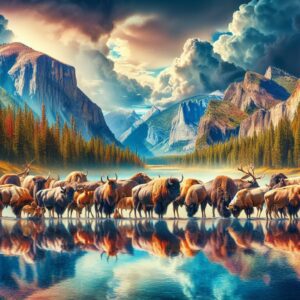
Location and Geography:
Where is Yellowstone National Park?
Yellowstone National Park is primarily in the U.S. states of Wyoming, Montana, and Idaho.
In what state and city is Yellowstone National Park located?
The park is mostly in Wyoming, with small parts in Montana and Idaho. It doesn’t belong to a city but is near towns like West Yellowstone, Gardiner, and Cody.
What states does Yellowstone National Park cover?
Yellowstone extends into three states: mostly Wyoming, with northern edges in Montana and eastern parts in Idaho.
Size and Area:
How big is Yellowstone National Park?
Yellowstone covers about 2.2 million acres, making it one of the largest national parks in the U.S. It spans over 3,468 square miles.
Travel and Transportation:
How to get to Yellowstone National Park?
You can reach Yellowstone by car from surrounding states. The nearest airports are in Bozeman, Montana, and Jackson Hole, Wyoming, followed by a drive to the park.
What is the closest airport to Yellowstone National Park?
The closest airports are Bozeman Yellowstone International Airport in Montana and Yellowstone Regional Airport in Cody, Wyoming.
How far is Yellowstone National Park from major nearby locations?
From Glacier National Park, it’s about a 6-7 hour drive. From Salt Lake City, it’s approximately 320 miles or a 5-6 hour drive.
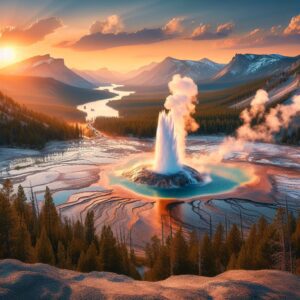
Accommodation:
Where to stay in or near Yellowstone National Park?
Inside the park, options include lodges like Old Faithful Inn and Lake Yellowstone Hotel. Nearby towns like West Yellowstone and Gardiner offer hotels and rentals.
Activities and Visiting:
What to do in Yellowstone National Park?
Activities include wildlife viewing, visiting geysers like Old Faithful, exploring the Grand Canyon of the Yellowstone, hiking, and attending ranger-led programs.
When is the best time to visit Yellowstone National Park?
The best time is late spring (May-June) for wildlife and fall (September-October) for fewer crowds and pleasant weather. Winters are great for snow-based activities.
How to plan a trip to Yellowstone National Park?
Research attractions, book accommodations well in advance, plan for varying weather, and consider spending at least 3-4 days to explore the park’s major sights.
General Information:
What is Yellowstone National Park known for?
Known for its geothermal features (like geysers and hot springs), wildlife, the Grand Canyon of the Yellowstone, and as the first national park in the world.
When is Yellowstone National Park open and closed?
Yellowstone is open year-round, but access to certain areas is seasonal due to snow. Most roads close from early November to late April.
Who owns Yellowstone National Park?
Yellowstone is a federal public park owned by the U.S. government and managed by the National Park Service.
What is the elevation of Yellowstone National Park?
Elevations range from about 5,282 feet to 11,358 feet, with an average elevation around 8,000 feet.
How old is Yellowstone National Park?
Yellowstone was established in 1872, making it over 150 years old as of 2024.
Each of these attractions contributes to the unique and diverse experience that Yellowstone National Park offers, making it a must-visit destination for nature and wildlife enthusiasts.
Yellowstone National Park Map:
Yellowstone’s vast expanse, dotted with geysers, wildlife, and breathtaking landscapes, is a world to explore, and a detailed map is your treasure guide. Whether you’re navigating the winding trails, pinpointing the location of the legendary Old Faithful, or finding the best spots for wildlife viewing, a Yellowstone map is an indispensable tool. It not only guides you through the park’s main attractions but also reveals hidden gems and ensures you make the most of your adventure in this natural wonderland.
Yellowstone National Park Camping:
Camping in Yellowstone is an experience like no other. Imagine waking up to the sounds of nature, with a panoramic view of pristine landscapes right at your tent’s doorstep. The park offers a variety of campgrounds, each with its unique charm, be it near gushing geysers, tranquil lakes, or amidst dense forests. Whether you’re a seasoned camper or trying it for the first time, camping in Yellowstone brings you closer to nature and offers a star-filled night sky like no other.
Yellowstone National Park Volcano:
The very ground of Yellowstone tells a tale of volcanic activity spanning millions of years. Home to one of the world’s largest super-volcanoes, the park is a living laboratory for geologists. Visitors are fascinated by the thermal features – geysers, hot springs, mudpots, and fumaroles – all powered by this immense volcanic force beneath. While the volcano is currently dormant, its presence adds a thrilling edge to the park’s allure, reminding us of nature’s powerful forces at play.
Yellowstone National Park Grizzly Bears:
Grizzly bears, the icons of wilderness, roam the landscapes of Yellowstone. Seeing these magnificent creatures in their natural habitat is a highlight for many visitors. The park provides a safe haven for these bears, and it’s essential for visitors to observe them from a safe distance. Educational programs on bear safety and behavior enrich the visitor experience, making bear sightings both exhilarating and respectful of wildlife.
Yellowstone National Park Bear Attack:
Bear attacks in Yellowstone, while extremely rare, remind us of the respect and caution needed in wild animal territories. The park educates visitors on bear safety, emphasizing the importance of keeping a safe distance, properly storing food, and understanding bear behavior. These guidelines are crucial for both the safety of visitors and the protection of bears.
Yellowstone National Park RV Camping:
RV camping in Yellowstone offers a comfortable way to immerse in the park’s beauty. The park’s campgrounds accommodate RVs, providing a perfect blend of adventure and convenience. Imagine enjoying your morning coffee with a view of elk grazing nearby, all from the comfort of your RV. It’s a popular choice for families and those who love road trips, blending the comfort of home with the thrill of the great outdoors.
Yellowstone National Park Reservations:
Making reservations in Yellowstone is key to a hassle-free visit. Whether for camping, lodging, or guided tours, securing your spot ahead of time ensures you don’t miss out on the best experiences. Early reservations are especially crucial during peak seasons, when the allure of Yellowstone attracts visitors from around the globe.
Yellowstone National Park Road Closures:
Road closures in Yellowstone, often due to weather or maintenance, are an important aspect of trip planning. Keeping abreast of these updates helps visitors reroute their journey or adjust their itinerary. This knowledge ensures a smooth and enjoyable exploration of the park, without unexpected detours or disappointments.
Yellowstone National Park Entrance Fee:
Its 25$ per car and best deal is to buy the “America, the beautiful” Annual pass. We always do that. One pass allows us unlimited entry to multiple national parks for a year.
The entrance fee for Yellowstone is a small price for the vast natural beauty and adventure it offers. These fees are vital for the maintenance and preservation of the park, contributing to conservation efforts, infrastructure, and visitor services. By paying this fee, visitors play a part in sustaining Yellowstone’s legacy for future generations.
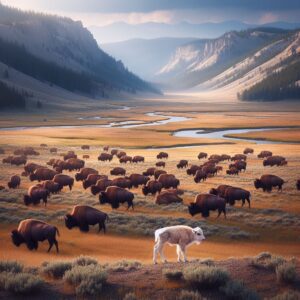
Yellowstone National Park Campgrounds:
The campgrounds in Yellowstone offer a diverse range of settings for overnight stays in the heart of nature. From the serene lakeside to the forest-covered grounds, each campground has its unique appeal. They provide basic amenities and are strategically located for easy access to hiking trails, wildlife viewing, and the park’s famous geothermal features.
Yellowstone National Park Hours:
Yellowstone’s hours vary by season and location within the park. While the park is open 24/7, certain facilities, like visitor centers and historic sites, have specific operating hours. Checking these hours beforehand ensures you don’t miss out on informative talks, guided tours, or a visit to the iconic Old Faithful Visitor Center.
Yellowstone National Park Itinerary:
Crafting an itinerary for Yellowstone requires balancing sightseeing, wildlife viewing, and relaxation. A well-planned itinerary could include a morning witnessing Old Faithful’s eruption, an afternoon hike through the Grand Canyon of Yellowstone, and an evening stargazing. Remember to include some flexible time for unexpected discoveries and leisurely exploration.
Yellowstone National Park Tour:
Guided tours in Yellowstone are a fantastic way to gain deeper insights into the park’s history, geology, and wildlife. From bus tours covering the major sights to specialized wildlife or photography tours, there’s something for every interest. These tours are led by knowledgeable guides, offering a richer and more informed park experience.
Yellowstone National Park Weather in May:
May in Yellowstone is a time of transition, with melting snows giving way to spring’s bloom. Weather can be unpredictable, ranging from sunny days to sudden snowfalls. This month offers a unique opportunity to see the park awaken from winter, with wildlife becoming more active and the first wildflowers appearing.
Yellowstone National Park Hot Springs:
The hot springs of Yellowstone are natural wonders, famed for their vibrant colors and steamy waters. The Grand Prismatic Spring, with its rainbow-like rings, is a must-see. These springs are not just beautiful; they’re a testament to the park’s volcanic activity, offering a hotbed of geological learning.
Yellowstone National Park Vacation:
Planning a vacation in Yellowstone is an exciting endeavor. From choosing the perfect lodging to scheduling tours and hikes, every aspect of the trip promises adventure and discovery. It’s a chance to disconnect from the routine and reconnect with nature in one of the most stunning settings on Earth.
Yellowstone National Park Wildlife:
The wildlife in Yellowstone is as diverse as its landscapes. From the majestic bison to the elusive wolf, the park is a haven for some of North America’s most iconic species. Ethical wildlife watching respects the creatures’ space, ensuring their safety and the preservation of their natural behaviors.
Fun Facts About Yellowstone National Park:
Yellowstone is full of surprises and intriguing facts. Did you know that it sits atop a massive volcano, or that it has more geysers than anywhere else on Earth? The park’s history as the first national park and its role in wildlife conservation are just as fascinating, adding layers of wonder to your visit.
